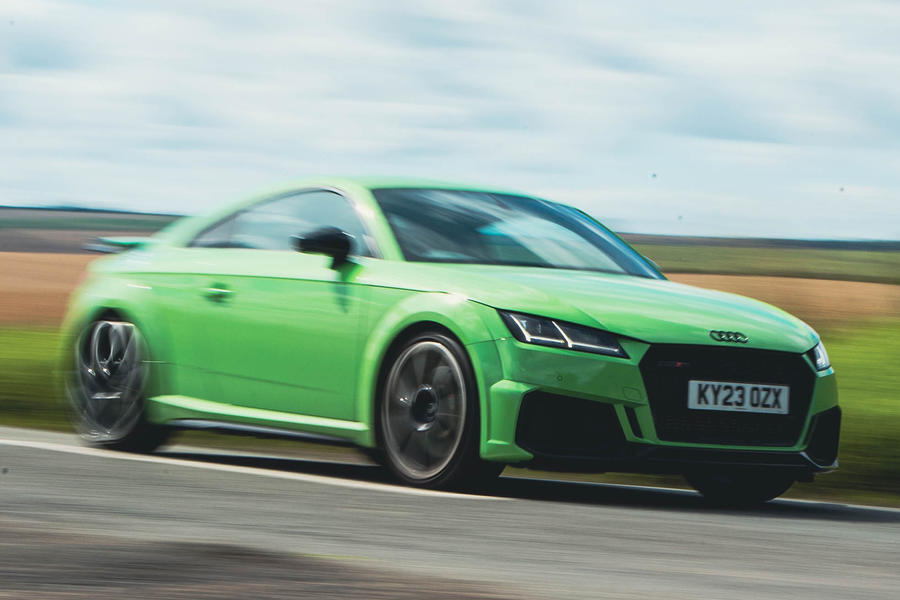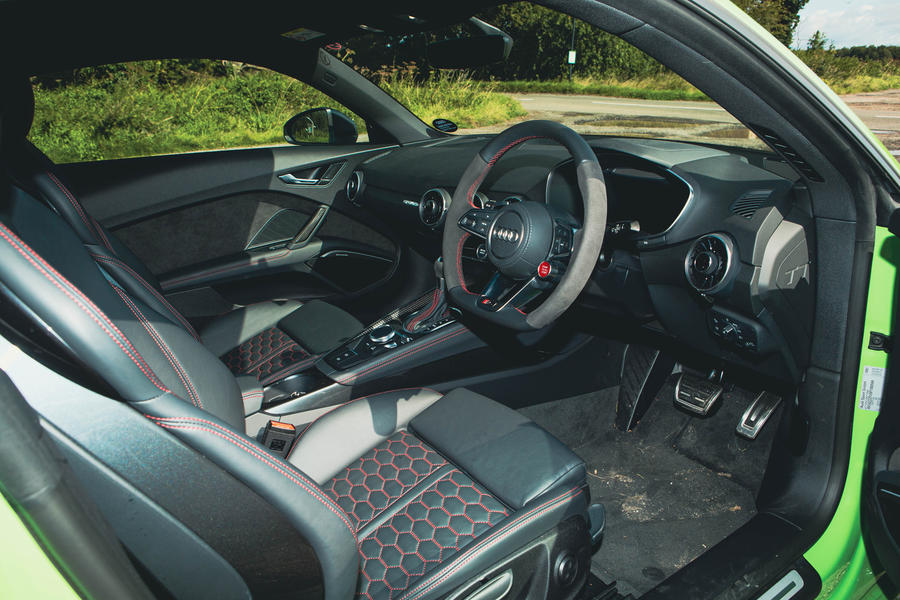Last hurrahs rarely sound as emotionally charged as this car’s. We couldn’t resist…
Why we’re running it: Audi’s everyman sports car is bowing out after 25 years and its five-pot is on borrowed time. Let’s celebrate both
Month 1 – Specs

Life with an Audi TT RS: Month 1
Welcoming the TT RS to the fleet – 18 August 2023
It’s the noise that will get you first. Rasping and raucous from cold, it evolves into a reassuringly mean-sounding thrum as the temperature builds, echoing obnoxiously but hilariously off the car park walls as you nudge towards the exit.
Whereupon, should you have sufficiently warmed the engine through and the road ahead is clear, you might see fit to liberate the entirety of this five-pot’s vocal range, which becomes ever more boisterous and unruly with each ascent towards the redline.
It grunts and growls with increasing alacrity as the revs build, the turbo whistling to announce its presence as pressure builds, towards a crescendo that puts you in mind of some of the greatest rally cars to ever pound this earth – and then you get to shift up and do it all again.
I like it, basically. Really like it. Even were it not for the commemorative, eulogistic nature of our time together, the snorting, thumping TT RS would have already got well under my skin for the sheer viscerality of its accelerative behaviour.
Such as it is, I’m basically looking for any excuse to fire it up, put the exhaust in Sport mode and enjoy the soundtrack wherever I can. I can’t vouch for the neighbours’ mutual appreciation.

Perhaps you will excuse a degree of antisocial behaviour: nine in 10 of the cars I drive at the moment make no noise at all, and the ones that do tend to emit a somewhat soulless melody, one that’s either devoid of character by dint of having no aspirations to sportiness, synthesised to the point of disingenuousness or stifled by mandated emissions-inhaling hardware.
The 2.5-litre turbo five-cylinder unit in the nose of the TT feels, comparatively, like an exercise in automotive theatre. And that’s after Audi was forced to fit a petrol particulate filter in pursuit of reduced CO2 output. Which is basically why it’s here.
Not to put too fine a point on it, but this is the oldest car currently occupying a space in Autocar’s ever-varied long-term fleet garage. Our Kyalami Green example (which I point-blank refuse to name after any famous Muppet, ogre or Marvel superhero, no matter how much anyone else might be inclined to) wears a shiny new 23-plate, of course, but it will be one of the last top-drawer TTs to do so because the model line is bowing out in 2023 after a quarter-century of service and has yet to be confirmed for a revival of any kind.
That’s a bit gut-wrenching in its own right, whatever your automotive proclivities. It would be difficult to dispute the seminal nature of the Mk1 TT, and we’ve always admired the TT’s propensity to combine everyday liveability with joviality – an attribute that’s arguably been keenest felt in this third0generation car, which was launched way back in 2016.
But it’s doubly troubling because the most potent of the TT bunch, the RS, is just one of three cars – not just in the Adu line-up, but on sale full stop – to pack a forced-induction straight-five punch.
This is a motor that merits celebration. Of course, we could have done so by spending time with the technically related RS3 mega-hatch or the loftier RS Q3 crossover, but because Audi’s sports coupe will be the first of the fivers to leave us, it is most deserving of a final blast – and arguably is the most spiritually authentic embodiment of the all-paw, five-pot sports car.

Short of stealing the Sport Quattro from the window display of Audi’s swanky flagship showroom in Brentford, this is about as good as it gets. So this is an exercise in recording everything that makes this car great, every aspect we willtearfully recall during a speech at the Autocar New Year’s party as we look ahead to 2024, the first year since 1996 without a TT on sale.
It’s a task I’m obviously glad to take on, but not one I’m taking lightly. After all, what you’re looking at is a £64,000 coupé that gets you about 90% of the way to fully-fledged supercar performance.
In a world saturated with £300,000 Italian exotics and unobtainable Stuttgart specials, this is – pound for pound – about as much grunt as the everyman can lay his hands on. It’s not especially light and that terrifically vocal engine musters a ‘mere’ 395bhp, but it will keep pace with an Aston Martin DB12 from 0-62mph and feels suitably limber in the twistier bits to warrant.
We already like the comparison with its old foe, Porsche Cayman. Although a big question to answer over the coming months will be whether we will remember the most potent TT solely for its sense of theatre, rather than its dynamic performance; we’ve always thought the Audi lacked that crucial element of tacticity common to the Cayman, Alpine A110 and various equivalent Lotuses.
A semi-supercar it may be, but this is a fearsome 4WD coupe that shares the bulk of its underpinnings with none other than the VW Golf, and although we have that cost-effective technical relationship to thank for the TT’s lengthy lifespan and granite-hewn construction, the fact remains that the TT was not ‘born a sports car’ in the same way as its rivals.
Whether or not that overly matters – now or in the years to come – is my solemn duty to ascertain. Fire up the Quattro!
Second Opinion
How sad that Audi can’t find space in its future line-up for a TT. It’s the antithesis of me-too crossover and feels one of those rare things these days: a car you would want to keep and own with your own money, so much more than a commodity purchase on a PCP or lease deal.
Mark Tisshaw
Audi TT RS Sport Edition S Tronic specification
Specs: Price New £64,445 Price as tested £66,390 Options
Test Data: Engine 2.5-litre turbocharged five-cylinder petrol Power 395bhp at 4000rpm Torque 354lb ft 1700-5850rpm Kerb weight 1450kg Top speed 174mph 0-62mph 3.7sec Fuel economy 31.0mpg CO2 207g/km Faults None Expenses None
Source: Autocar
